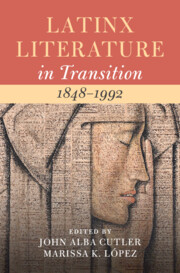Book contents
- Latinx Literature in Transition, 1848–1992
- Latinx literature in transition
- Latinx Literature in Transition, 1848–1992
- Copyright page
- Dedication
- Contents
- Figures
- Contributors
- Acknowledgments
- Introduction
- Part I Space
- Part II Being
- Chapter 5 Brown Modernism from María Cristina Mena to Gloria Anzaldúa
- Chapter 6 The Spanish–Indigenous Binary and Anti-Blackness as Literary Inheritance
- Chapter 7 The Camaraderie of Influence
- Chapter 8 Spiritual Service and Gendered Labor
- Part III Time
- Part IV Form
- Part V Labor
- Bibliography
- Index
- References
Chapter 6 - The Spanish–Indigenous Binary and Anti-Blackness as Literary Inheritance
from Part II - Being
Published online by Cambridge University Press: 10 April 2025
- Latinx Literature in Transition, 1848–1992
- Latinx literature in transition
- Latinx Literature in Transition, 1848–1992
- Copyright page
- Dedication
- Contents
- Figures
- Contributors
- Acknowledgments
- Introduction
- Part I Space
- Part II Being
- Chapter 5 Brown Modernism from María Cristina Mena to Gloria Anzaldúa
- Chapter 6 The Spanish–Indigenous Binary and Anti-Blackness as Literary Inheritance
- Chapter 7 The Camaraderie of Influence
- Chapter 8 Spiritual Service and Gendered Labor
- Part III Time
- Part IV Form
- Part V Labor
- Bibliography
- Index
- References
Summary
This chapter examines ideological underpinnings of the Spanish–Indian binary in Mexican and Mexican American indigenism and mestizaje. In a reassessment of Chicanx literary history, it looks at the life and writings of sixteenth-century Dominican cleric, Bartolomé de las Casas, and twentieth-century Chicana writer Gloria Anzaldúa. Las Casas has long been considered a literary precursor to nineteenth- and twentieth-century Mexican American literature, as well as Latinx literature more broadly. Gloria Anzaldúa remains one of the most celebrated and influential late twentieth-century Chicana writers. More specifically, this analysis urges a reconsideration of las Casas’s founding influence, foregrounding his almost lifelong support for the enslavement of African people, as it also explores contemporary vestiges of the anti-Blackness strategically at the center of las Casas’s defense of Indigenous people of the Americas.
Keywords
- Type
- Chapter
- Information
- Latinx Literature in Transition, 1848–1992 , pp. 111 - 125Publisher: Cambridge University PressPrint publication year: 2025

